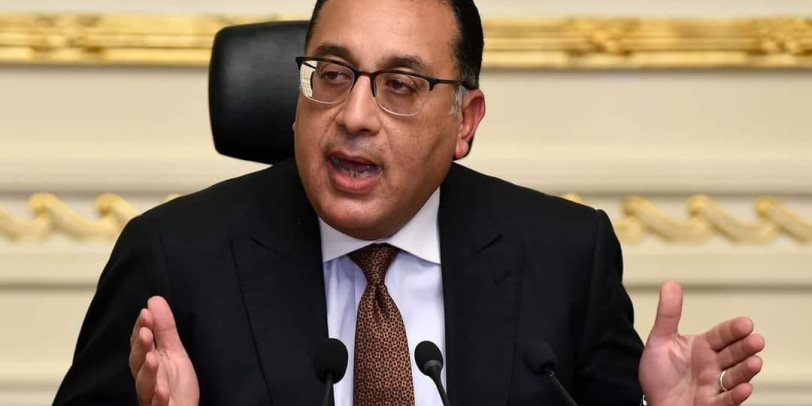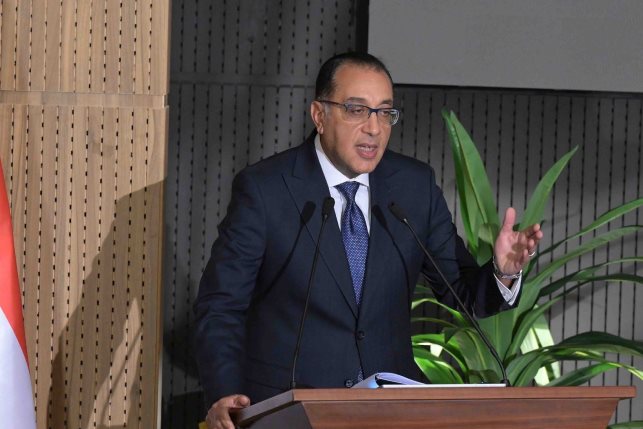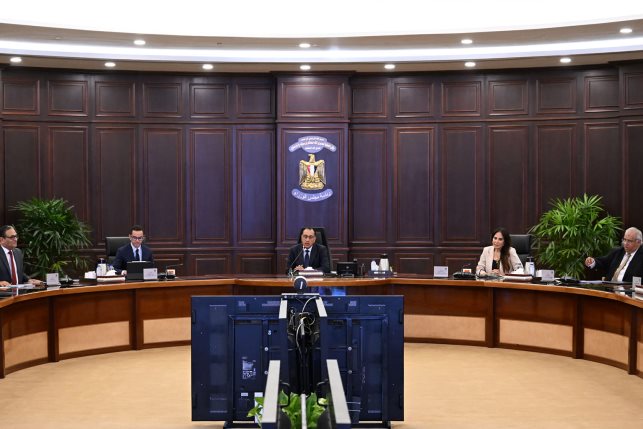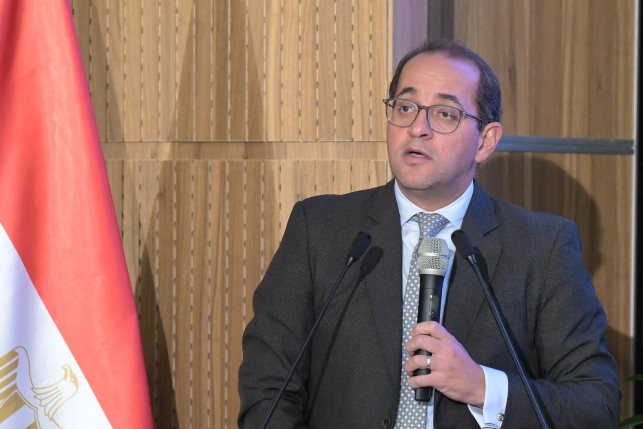IN DEPTH: Egyptian gov't takes bold steps to tackle inflation, announces significant price reductions for essential goods
Egypt Launches Comprehensive Initiative to Reduce Essential Goods Prices!
 PM Mostafa Madbouly at a press conference to unveil details of an agreement reached regarding the "Initiative to Reduce Prices of Essential Goods" - Press Photo
PM Mostafa Madbouly at a press conference to unveil details of an agreement reached regarding the "Initiative to Reduce Prices of Essential Goods" - Press Photo
Egypt's Prime Minister, Dr. Mostafa Madbouly, held a press conference today to unveil the details of an agreement reached regarding the "Initiative to Reduce Prices of Essential Goods." The conference was attended by key ministers and officials, emphasizing the government's commitment to tackling the pressing issue of inflation that concerns the Egyptian citizens.
In his opening remarks, Madbouly welcomed the ministers and officials, highlighting the government's dedication to addressing the issue of inflation, which has been a significant concern for the Egyptian populace. He acknowledged that rising food prices were a global phenomenon exacerbated by various crises and emphasized the need for all nations to find solutions to cope with these challenges.
Prime Minister Madbouly underscored the collaborative efforts between the government, industrial chambers, and trade unions to control inflation.
Several meetings were conducted with industry chambers and trade unions, focusing on short-term inflation control and long-term strategies to boost local industries. He stressed that the root cause of the problem lay in the scarcity of supply, especially for essential food items. To address this, the government is working to increase the availability of raw materials and production necessities, requiring enhanced foreign currency allocation.
.jpg)
The Prime Minister outlined the measures taken, including discussions with relevant ministries and private sector representatives. As a result, seven main categories of essential goods, including beans, lentils, dairy products, white cheese, pasta, sugar, cooking oil, and rice, will witness price reductions ranging from 15% to 25%. Additionally, agreements have been reached with poultry and egg producers for a 15% reduction in live and frozen poultry and egg prices.
Moreover, Prime Minister Madbouly highlighted ongoing efforts for continued collaboration between the government and the private sector to monitor prices and address any challenges swiftly. Weekly meetings will be held to ensure price stability and promptly resolve issues, emphasizing the government's focus on not only temporary reductions but also long-term stability.
Ahmed El-Wakil, Head of the General Union of Chambers of Commerce, expressed gratitude during the press conference, acknowledging the government's collaboration with the private sector to address Egypt's challenges. He praised the swift decisions made by Prime Minister Madbouly and outlined the initiatives, emphasizing their positive impact on improving citizens' quality of life.
The Egyptian government's proactive approach in collaboration with private sector entities showcases a commitment to resolving the challenges faced by the nation. This initiative is a testament to the government's dedication to the welfare of its citizens, aiming not only for short-term relief but also long-term stability in essential goods' prices.
He continued, “Once again, we intend to continue our cooperation and work together diligently to confront these challenges - in certain stages - according to market mechanisms. In conclusion, the representative expressed gratitude to the Egyptian private sector, which participates with a national sense deserving of thanks, emphasizing that history bears witness to the fact that the private sector always works for the benefit of our beloved Egypt.”
On his part, Mr. Mohamed El Sweidy, Head of the Egyptian Industries Federation, expressed his happiness at holding this productive meeting, noting that the government has taken serious and practical measures in the current phase.
He said, 'There is mutual cooperation between the government and the private sector to ensure the continuity of factories and, at the same time, to ensure the availability of goods at lower prices and abundance in the markets.' He also pointed out that a lack of abundance of goods leads to price increases.
The Head of the Industries Federation added, 'The steps agreed upon today are very serious, and we have been cooperating together for the continuity of factories since 2011. This stems from the national role, especially in times of crisis.
He stressed the private sector's commitment to its role in this regard in the coming period, in order to make essential goods available and reduce their prices. He said, 'The state has gone through many crises, and any crisis will end thanks to this cooperation and joint coordination.'
Mr. Anwar El Abd stated, “A meeting was held with the Minister of Agriculture and producers, and an agreement was reached to reduce prices for poultry and eggs by 15%, providing a detailed breakdown of prices before and after the reduction.”
The Prime Minister concluded the press conference by expressing his thanks once again to various relevant parties, especially the Egyptian private sector, appreciating the response of this national sector to the government's decisions, which have already begun to be implemented fully, starting from next Saturday at the latest.
In this context, Madbouly pointed out that what has been agreed upon in cooperation and coordination with the Federation of Chambers of Commerce and the Industries Federation includes the complete announcement of prices of targeted goods, either in writing or printed on those goods. He added that there has also been an agreement with the commercial chains to ensure an abundance of targeted goods in the initiative, without profit margins.
The Prime Minister confirmed that the initiative to reduce prices of several essential commodities is ongoing in terms of effectiveness and implementation, as long as the agreed-upon measures by various relevant parties are carried out.
He explained that regarding poultry, the initiative will initially apply for three months and may extend further, but for other essential commodities, the initiative will apply for at least six months. He noted that there will be continuous evaluation and monitoring of various aspects of this initiative, ultimately to curb inflation.
The Prime Minister also noted that the state continues to implement measures, whether in terms of providing more facilitations, granting exemptions, or providing special facilities for releasing goods and shipments.
He emphasized, “On the other hand, there will be control over the various chains related to supplying final products to citizens, and any type of unfair manipulation of prices for these goods under this initiative will be subject to various measures.” He said, “The private sector will announce the prices of essential goods agreed upon within the initiative, and therefore, there will be no allowance for any price increase for those goods, and the state will take care of maintaining prices for these essential goods in the coming period.”
Dr. Madbouly further pointed out that the major crises faced by various countries worldwide, including Egypt, are unprecedented crises.
He mentioned that the world is facing many new crises and significant challenges, saying, “There is no country that does not face the same crises that Egypt faces, and the severity of these crises may vary from one country to another, depending on the state's ability to deal with crises.”
He added, “Egypt, God willing, is capable of overcoming these crises and emerging from them, confirming that we have the vision and plans to deal with crises. What is announced is actionable and has been put into execution, not just visions and plans that are not implementable.” He noted that the state aims to reduce inflation and reduce inflationary pressures on many institutions and the Egyptian citizen in the coming period.
In conclusion, the Prime Minister pointed out that today is a happy day for Egypt, as an event will be held today to announce Egypt's achievement of the gold certificate in completing the path to eradicating the "C" virus in Egypt. He emphasized that this issue was of utmost importance, as there was not a single Egyptian family without a member suffering from this disease.
Talking about finding a treatment provided by the state represented a dream, but Egypt has transitioned from having the highest infection rates of this disease to being one of the first countries that the World Health Organization announces has succeeded in eradicating this virus.





